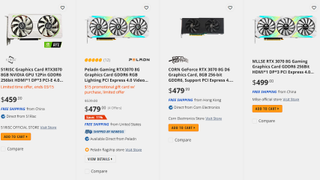Chinese Brands Flood U.S. Retail With Not-So-Cheap Graphics Cards
Worth buying?

A number of little-known suppliers of graphics cards that used to sell their products on various China-based marketplaces are now available in the U.S. from respected retailers like Amazon and Newegg. These add-in-boards (AIBs) are neither too cheap nor too expensive, but they all started to show up in the U.S. around the time when the Ethereum cryptocurrency mining boom went bust.
While everyone knows Asus, Gigabyte, and MSI, very few people know about such brands as 51Risc, AX Gaming (an Inno3D sub-brand), Corn, Maxsun, Mllse, and Peladn. These companies used to sell their products exclusively on market places like AliExpress or Taobao, targeting customers in the Asia Pacific region as well as desperate enthusiasts willing to buy something exotic like a desktop graphics card based on Nvidia's GeForce RTX 3070 Ti Laptop GPU.
So far, these companies aren't trying to sell such exotic products in the U.S., and many of their offerings could easily end up in our list of the best graphics cards as they feature configurations recommended by AMD and Nvidia. Graphics cards sold under these trademarks are sometimes cheaper than competing offerings from well-known brands and sometimes they cost more.
For example, 51Risc's GeForce RTX 3070 is priced at $459 at Newegg, which is cheaper than Gigabyte's Eagle GeForce RTX 3070 that retails for $499 and Maxsun's GeForce RTX 3070 that is priced at $519 (and comes bundled with a $20 promo gift card). Meanwhile, the GeForce RTX 3070 graphics cards from Mllse and Peladn look identical, so although the latter is $20 cheaper; it looks like both boards are made at the same factory, with only the fan stickers to differentiate them.
It's hard to say for certain why these little-known brands have decided to compete head-to-head against big names at Amazon and Newegg, but one may argue that competition is always good and the more the merrier. That's assuming the cards are actually fully functional and deliver the expected performance, which isn't something we've been able to test. There's also the question of warranty support should you encounter problems down the road.
The total available market of discrete graphics cards for desktop PCs is not particularly large: about 38 million units valued at $24.14 billion were sold last year, according to Jon Peddie Research. Yet, there is a cut-throat competition between AIB suppliers.
There are about a dozen big graphics cards makers with well-known trademarks, plus several sub-brands that aim for specific geographies. For example, Palit makes a lot of GPUs for the worldwide market, while it also sells (nearly identical) KFA2 and Galax brands for the European and U.S. markets. Historically, there used to be the so-called no-name brands, but they went extinct as the graphics cards TAM has shrunk from around 85 million units in 2006 to approximately 38 million in 2022.
Nonetheless, there are still small suppliers of graphics cards that may not sell in huge volumes, but which appear to be bold enough to put up a fight against giant companies for the U.S. market. The only question is whether they plan to stay for long, or just sell some boards because they could not sell them elsewhere?
Stay On the Cutting Edge: Get the Tom's Hardware Newsletter
Get Tom's Hardware's best news and in-depth reviews, straight to your inbox.

Anton Shilov is a Freelance News Writer at Tom’s Hardware US. Over the past couple of decades, he has covered everything from CPUs and GPUs to supercomputers and from modern process technologies and latest fab tools to high-tech industry trends.
-
Reply
Why? Can't you just send them back to Amazon or Newegg and let them handle the rest? In Europe, you don't have to care about the manufacturer's RMA policy. You just send the card back to the seller, and then it's the seller's problem.purple_dragon said:Good luck trying to rma any of these brands if your in the USA. -
mikeebb Reply
Simple answer, no, you can't return to the seller, unless it's actually a "house brand" which these are not. If the card is truly DOA, yes, you should be able to return it for replacement, but that's as far as it goes. Otherwise, as with all computer gear, the warranty (if any) is between you and the OEM, and if the OEM has no US presence, then, well, I agree with Purple Dragon.Nolonar said:Why? Can't you just send them back to Amazon or Newegg and let them handle the rest? In Europe, you don't have to care about the manufacturer's RMA policy. You just send the card back to the seller, and then it's the seller's problem.
Most Popular




